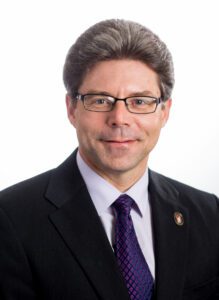
Jeffrey S. Russell began his career in the 1980s as a traditional “sage on a stage”: an engineering professor lecturing to students in front of the classroom. Higher education has changed dramatically since then, requiring Russell to rethink his approach to teaching and learning. In a recent presentation at his alma mater, Purdue University, he explored the latest ideas for engaging students in the 21st century.

Russell, now the dean of Continuing Studies and vice provost for Lifelong Learning at the University of Wisconsin-Madison, was an early experimenter in online teaching. Though revolutionary at the time, this pedagogical technique didn’t differ significantly from the traditional model. Russell simply captured his lectures on video so students could watch them online. Though learners had more flexibility, they completed assignments and took exams in the standard fashion. Russell’s relationship with them remained largely unchanged.
Teaming with engineering faculty at UW-Madison, Russell developed a more collaborative approach to teaching online. Students worked with instructors in teams rather than passively absorbing a lecture. Faculty actively facilitated and inspired learning, sharing knowledge through projects.
Now that learning in the digital space has become the norm, Russell is again reconsidering his approach, focusing less on grades and more on the learning process and its outcomes. The emphasis is on learning by doing, with faculty and students investing their time in applied work and feedback. In this model, reworking assignments becomes essential to gaining mastery. Instructors lay a foundation, providing structured opportunities for students to learn both independently and from their peers. They encourage students to become fully involved in their own education and coach them as they develop the skills to do so effectively throughout their careers.
Training 21st century engineers
Addressing an audience of mostly engineering students concerned with their own teaching and learning paths, Russell noted drastic changes in the construction industry. The field has transitioned from local firms and traditional contracts to global companies and digital systems. Russell asked: Should higher education change accordingly to address the complexities of a globally connected world?
Clearly, the old teaching model—“I teach and you listen”—will not be suitable in this new environment. For the instructor, that model implies: “My responsibility ends when I have spoken.”
In the 21st century, an instructor’s motto must be: “Your learning is my responsibility. I can and must do everything possible to make it happen.”